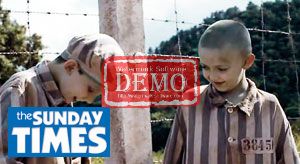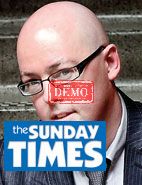John Boyne seems to have become a historical novelist despite himself. “At the start of my career I hadn’t planned on writing a series of novels set in the past; it has happened through chance more than design,” he says. The Irish author of the award winning bestseller ‘Boy in the Striped Pyjamas’ and more recently ‘The Absolutist’, is decidedly prolific – he is one book short of a full ten, and has many times that number of short stories to his name.
He describes his novels as attempts to recreate “lost worlds” and his research takes him all over the globe. To write his ‘The House of Special Purpose’ (the book with its unlikely hero has been described as ‘part love story, part historical epic, part tragedy’) he spent some time in St Petersburg and actually wrote most of the Russian side of the novel in the Winter Palace and the Hermitage itself.
For ‘The Absolutist’ he read the letters of First World War soldiers and studied in the Imperial War Museum. “It’s fascinating (to me) to spend two years completely immersed in a time and place and then move on to something entirely different,” he explains.
The author, who will visit Sri Lanka for the first time in 2012 for the Galle Literary Festival, says he’s looking forward to meeting writers from this part of the world and listening in on conversations that explore the literary heritage of the Island. John is currently in the process of finishing a new children’s novel which will be published in the UK in September 2012 and is about to start work on a new novel for adults.
What are you reading now? Are you enjoying it?
A few minutes before starting to answer these questions, I finished the second volume of Haruki Murakami’s ‘1Q84’. I’m enjoying it very much and looking forward to beginning the third and final volume.
Where do you most like to read?
Travelling – on a plane, a train or a boat – is always a great time to read. Whenever I have a trip scheduled I save up a new book to begin the morning I arrive at the airport. (I’m typing this from Helsinki and brought the Murakami with me here.) I like the long, interrupted hours and the fact that, if it’s a long trip, one can often make it through an entire novel before reaching one’s destination.
The Holocaust has been the subject of so many novels – why do you think writer after writer has chosen to grapple with it? In your opinion, who has handled it with the most grace?
It’s often said that novelists aren’t there to answer questions but to pose them better. The reason so many writers explore the subject matter of the Holocaust is because nobody in the world has ever offered a convincing explanation for why such a terrible crime could take place in our world. We write to understand it better, to try to make some sense of it. We generally fail because there are some things which are impossible to make sense of. The books which have moved me the most on the subject are those written by people who actually went through this most horrific of ordeals: Primo Levi, Eli Wiesel, Anne Frank.
You’ve named Charles Dickens and John Irving, writers separated by more than a century, “as your two greatest influences.” They have very distinct voices but what would you say, if anything, they had in common? Which books would you consider their finest works?
They both write (or, in Dickens’ case, wrote) long, half-comic, half-serious novels exploring the lives of young characters growing up, trying to establish themselves in the world, finding love, losing it. Dickens is more concerned with social justice, Irving with sexuality. They are most connected in Irving’s The Cider House Rules – my favourite of his works – which is mainly set in a boys’ orphanage, and orphanages are of course popular settings in Dickens’ novels. My favourite Dickens is ‘David Copperfield’, which is in fact my favourite novel ever written.
As the author of approximately 70 short stories, where would you say the real art in constructing them lies? Is there a contemporary author you particularly admire as a master of the genre?
I always begin a novel with a clear idea of where it is going; I never begin a short story in that way. Short stories are wonderful for the fact that one can start with a simple line, a thread of an idea, and start working it out on the page. One might sense that it will take only 2,000 or 5,000 or 10,000 words to fully explore it but the completion of a good short story offers a reward almost unparalleled in literature. My favourite short story writer is Tobias Wolff.
 |
| A still from the movie ‘Boy in the Striped Pyjamas’. Pic courtesy ncowie.wordpress.com |
Whenever I feel in need of inspiration, or simply want to spend an hour lost in a brilliant world of story and character, I turn to Wolff’s Complete Stories and open them at random.
I used to write a lot more short stories when I was younger, however. It’s quite rare for me to turn my hand to them now. I’m not quite sure why that is.
What did you think of the film adaptation of your book ‘The Boy in the Striped Pyjamas’? Are there any other relatively recent books that you would list as having successfully made that same transition?
I was pleased with it and had a lot of contact with the filmmakers during pre-production and spent time on set in Budapest while we shot it. The novel tells the story from the point of view of the boy, Bruno, while the film tells the same story from the perspective of the family. It’s the same story, just explored in two individual ways. I think Mark Herman, the director, did an extraordinary job in keeping the essence of my novel on screen and never slipping into sentimentality. Some of my favourite screen adaptations include Anthony Minghella’s film of Patricia Highsmith’s novel The Talented Mr Ripley and James Ivory’s adaptation of Forster’s Howards End.
If you were to choose two books that both a child and an adult would enjoy equally, which would they be?
Robert Louis Stevenson’s ‘Treasure Island’ and L.P. Hartley’s ‘The Go-Between’.
|



